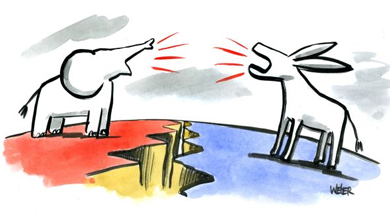Filter Bubbles & Opinion Polarization
Political Polarization: The type “opinion polarization” that I hear discussed most. Check out this ted talk that I like and watched recently. It definitely spurred a lot of the thoughts behind this blog post.
So how did I get into “opinion polarization”? Well, that’s what I fear most after doing this exercise.
I put out a lot of information. I looked at my 2 gb download from google for my NCSU account, but with my laptop’s small hard drive, I didn’t even want to download the 7gb file for my non-NCSU account. For my NCSU account, the vast majority of my information was stored in gmail and google drive, but I also liked the 27,000 lines of code that kept track of my youtube history (probably another 100k lines associated with my non-NCSUaccount). So it’s obvious, I produce data by the gigabyte for internet giants like Google and Facebook to use.
I need to disable adblock for a little while and see how advertisements are tailored towards me. I’m sure they are, I just only see them on select sites that require me to disable adblock – none of which are sites that I visit regularly. But even if I did notice the ads that target me, I don’t believe that I would be overly happy or overly unhappy with the targeted advertisements.
What I’m most concerned about is the bias in information that I’m shown. I go to the internet for information. It’s my primary means of communicating. I likely receive more information via chrome than I do via spoken word. Why meet for a project when I can use google docs? Why drive home when I can facetime? Why go to office hours when I can learn a concept on youtube? So if the internet is my main means of digesting information, then it is scary knowing that each time I digest some information, I become less likely to digest a different type of information. I had trouble with this filtering just last week as I struggled to find articles from European media outlets on the Brussels attack as part of the social network analysis project. This leads me to a question I asked myself earlier: Do I choose the friends that I fall out of contact with, or do the internet giants choose them for me? Similarly, do I choose to read a liberal article, or did the internet giants choose it for me?
I think that the Zucherberg quote about the relevant, dying squirrel and the irrelevant, dying East African has scary implications for the future of education in an internet-dependent world. We are supposed to be connected by the world wide web, but algorithms that excessively personalize information and create filter bubbles see us almost disconnected by the world wide web. Living in a filter bubble is a shame when I am 23 years old, but living in a filter bubble is a crime for someone who is 7 years old.
Polarization over important issues is a problem that drives people to not properly listen, or not even bother speaking. I hope that the internet, an education and information source for most of the world, does not exacerbate this polarization.

Thanks for your insightful response on this topic Raj! I think you make a really good point at the end of your post. College students may or may not posses the cognitive ability to identify that the internet may have encapsulated them in their own world, but it’s almost certain that children do not. College students and adults have several decades of experience and exposure to different points of view but a child’s brain is a sponge, and promoting a polarized mind could have unseen consequences down the road. I also found it interesting how much data I have accumulated in my short time at NCSU, its sobering to think of how much MORE data there is probably out there on us outside of our small google profile. Great response and interesting thoughts!